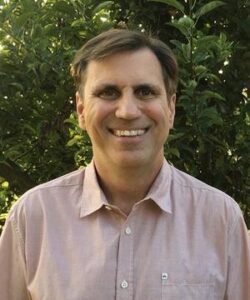 Today we feature an interview with Dr. Mark Graves. Dr. Graves is a research fellow at Fuller Theological Seminary and leads natural language processing (NLP) data science projects in the pharmaceutical and healthcare industries. He is also a member of the AI&Faith research team. He researches the ethics of using deep learning systems in medical applications and studies how moral psychology and philosophical theology can guide AI development.
Today we feature an interview with Dr. Mark Graves. Dr. Graves is a research fellow at Fuller Theological Seminary and leads natural language processing (NLP) data science projects in the pharmaceutical and healthcare industries. He is also a member of the AI&Faith research team. He researches the ethics of using deep learning systems in medical applications and studies how moral psychology and philosophical theology can guide AI development.
How would you describe your experience with AI?
I have been fascinated with AI since I was a preteen, reading science fiction and learning more about AI from an older cousin who worked in the field. During college I decided to pursue AI in my career and wrote my dissertation at the University of Michigan on knowledge representation, machine learning, and NLP. I first applied AI to genomics and molecular biology, then after an AI Winter when I worked with databases and studied theology, I began focusing my AI work on NLP.
How would you describe your faith background?
My faith background is multi-faceted. I grew up Southern Baptist in a small college town in East Tennessee. As I moved around and out of the South for school and work, I attended a variety of Protestant churches. Arriving in California, I became involved in a Roman Catholic spirituality center, which introduced me to Christian-Buddhist dialogue and eventually led me to study systematic and philosophical theology at the Jesuit School of Theology in Berkeley. I eventually converted to Christian Orthodox (Serbian), which broadened and deepened my faith perspectives.
What led to your interest in the intersection of AI and faith?
My faith development, work, and study in the biological and cognitive sciences led me to my involvement with several organizations working at the intersection of theology and science. I taught courses on the relationship between theology and science at seven institutions and wrote two books on philosophical theology and cognitive science. In 2014, as AI research and development began its resurgence, it made sense for me to shift my focus to AI and theology, given my background and experience. I undertook research fellowships taking computational approaches to moral psychology and neuroscience at Fuller Theological Seminary and to moral theology at University of Notre Dame, which focused my interest from general questions about AI and personhood to exploring what would be needed to construct moral AI.
Why are you involved with AI&F?
It was excited to discover an organization where so many people had a shared interest in the intersection of AI and faith. I quickly became involved with the Research Fellows to help coordinate and strengthen connections among those doing research related to that intersection and to liaise with Partnership on AI about our work. I was also attracted to the diverse perspectives AI & Faith members represented, both professionally and religiously. I think the combination of academic, business, and policy perspectives are important for fully engaging AI development and impact and believe the explicitly pluralistic religious orientation at AI & Faith is essential for global AI engagement.
How does AI&F affect your work outside the organization?
I find the AI & Faith network valuable for making connections to others doing similar work. Those conversations also help me to bridge my more academic and philosophical projects on moral AI with my more practical and business-focused work on ethics for healthcare data science and machine learning.
What open problems in AI are you most interested in?
My interests focus on the communication between people and AI. That drives my work in NLP to extend how AI systems can understand and model what people communicate through natural language about human values, morality, and spirituality. In turn, I use that grounded work to imagine what might be required for AI to extend those models toward a version of morality where AI could fully engage with humanity.
Acknowledgements
A big thanks to Dr. Mark Graves for his time to carry out this interview. Thanks to Emily Wenger for proofreading, editing, and publishing this work.


